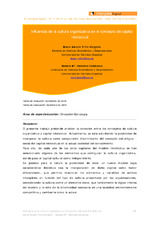Mostrar el registro sencillo del ítem
Influencia de la cultura organizativa en el concepto de capital intelectual
| dc.contributor.author | Trillo Holgado, María Amalia | |
| dc.contributor.author | Sánchez Cañizares, Sandra María | |
| dc.date.accessioned | 2012-08-31T11:59:12Z | |
| dc.date.available | 2012-08-31T11:59:12Z | |
| dc.date.issued | 2006 | |
| dc.identifier.uri | http://hdl.handle.net/10396/7789 | |
| dc.description.abstract | El presente trabajo pretende analizar la conexión entre los conceptos de cultura organizativa y capital intelectual. Actualmente, se está estudiando la posibilidad de incorporar la cultura como componente discriminante del concepto estratégico - social del capital intelectual en la actual sociedad del conocimiento. Para ello, de cada uno de los cinco capitales del modelo Intellectus se han seleccionado algunos de los elementos que configuran la cultura organizativa, dando paso al capital cultural como independiente. Se plantea para el futuro la posibilidad de crear un nuevo modelo cuya característica distintiva sea la incorporación de dicho capital como factor diferenciador, que permita relacionar los elementos y variables de activos intangibles en función del tipo de cultura presentado por las organizaciones, considerando la cultura como un elemento clave, que fundamente la lógica interna del modelo y lo dote de la dinamicidad necesaria en una sociedad eminentemente competitiva y cambiante como la actual | es_ES |
| dc.description.abstract | This paper tries to analyse the connection between organisational culture and intellectual capital. Nowadays, the possibility of incorporating cultural capital as a factor that distinguishes the strategic–social concept of intellectual capital in the actual knowledge society is being studied. In order to this, the elements that form organisational culture in each one of the five capitals of the “Intellectus Model” have been selected. They constitute an independent capital called cultural capital. A suggestion for the future is the possibility of creating a new model. Its peculiarity is the cultural capital incorporation as a distinguishing component. This would allow relating the intangible assets elements and variables depending on the organisational culture context. It is necessary to consider than this proposal must take into account the culture as a key element, in which is based the internal logic of the model. It also provides it with the necessary dynamic structure in a competitive and changing society as ours is. | es_ES |
| dc.format.mimetype | application/pdf | es_ES |
| dc.language.iso | spa | es_ES |
| dc.publisher | Universidad Politécnica de Cataluña | es_ES |
| dc.rights | https://creativecommons.org/licenses/by-nc-nd/4.0/ | es_ES |
| dc.source | Intangible Capital 11 (2), 164-180 (2006) | es_ES |
| dc.subject | Capital intelectual | es_ES |
| dc.subject | Cultura organizativa | es_ES |
| dc.subject | Modelo Intellectus | es_ES |
| dc.subject | Intangibles | es_ES |
| dc.subject | Gestión de empresas | es_ES |
| dc.subject | Intellectual capital | es_ES |
| dc.subject | Organizational culture | es_ES |
| dc.subject | Intellectus model | es_ES |
| dc.subject | Management | es_ES |
| dc.title | Influencia de la cultura organizativa en el concepto de capital intelectual | es_ES |
| dc.title.alternative | The influence of organizational culture on intellectual capital | es_ES |
| dc.type | info:eu-repo/semantics/article | es_ES |
| dc.rights.accessRights | info:eu-repo/semantics/openAccess | es_ES |

